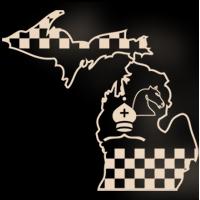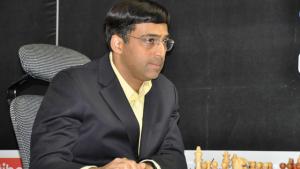
The Michigan Fall International, Part 2
I left you last week in Dearborn, Michigan, where I was playing in the Third Fall Festival, a strong international tournament. After five rounds I had 3.5 points, having faced three grandmasters. I had won in the second round as Black against the #3 player in the U.S., Timur Gareev. However, I had spoiled the next game by playing recklessly and losing against Carlos Matamoros. I didn't follow Tigran Petrosian's advice and make a draw after winning. (He also felt you should make a draw after losing - basically a draw anytime was good, in his opinion...) However, I managed to stabilize things, winning the next game against a woman grandmaster and drawing the fifth round with GM Alex Lenderman.
The next day I was paired with GM Mackenzie Molner (his grandmaster title had been approved just before the event). I knew that Molner was a very sharp and exact player with very good theoretical knowledge and preparation. A small surprise was in order:
After this complicated and dramatic game, I played another very adventurous game against GM Anton Kovalyov. I got the white pieces a second time in a row (the previous day I had played black twice in a row), and this time I went back to 1.e4. After only fourteen moves I was already down two pieces...
I was naturally very upset after this game. Here I played a game that looked like it came out of fantasy. Sacrifice of two pieces, queen sacrifices, underpromotions, and so on. And then I avoided a draw, reached a very easily-won endgame, and messed it up. It is not as if that ending was technically difficult in any way - I would certainly win it with just a little better attention and nerves.
Had I won this game, I would really only need half a point out of the last two games to make my last norm. It would be practically impossible to fail. But now I needed 1/2, starting with black against another young, ambitious 2600+ GM. It really looked like I was going to throw it away like I had in Arlington the week before.
There was one thing, however, which made it easier to sleep. In fact, it was probably better (for norm purposes, of course; not from the creative or prize angle) that I made a draw with Kovalyov rather than winning! Had I won I would have played Yuri Shulman, whose federation is U.S. That meant that if I was unlucky enough not to play a foreigner in the last round, I might not get the GM norm, regardless of my score. There were enough foreign players in the tournament as a whole that it should not matter whom I played, but some of those foreigners withdrew from the tournament or took byes, and recently FIDE has not been counting them for the foreigner requirement if they don't play the whole tournament. But since I drew, I ended up playing Alexander Ipatov, and that satisfied the foreigner requirement.

Clearly the goal was to hold - at least at first - and once again the Nimzo-Indian proved to be solid as a rock. It was not a very exciting game - I made a nervous mistake early on, giving my opponent a slight advantage. But despite that I never felt in any kind of danger, and eventually the game meandered towards a draw.
Clearly a rather dour defense, but it is not so easy to hold a draw standing slightly worse the whole game against a strong GM who really needs to use the white pieces near the end of the tournament.
Before the last round it was practically impossible to predict the pairings, because so many different people among the leaders of the tournament had already played each other. I saw there was a real danger that I could get paired with Shulman and get black again. Needing only a draw, the white pieces would be very nice, and playing black against somebody who is fighting for first place, knowing I only need a draw, would be a tough game. Fortunately for me there was a odd number of players with 5.5/8, so there was a chance I could get dropped to the next score group.
I was very nervous as I ate lunch. Finally I saw the pairings - I was paired with GM Mikheil Kekelidze. This was a great relief. Kekelidze had been in clear first place after six rounds, but then lost two games in a row, including a completely winning position against Matamoros in the previous round. He had a half point less than me, so he wasn't fighting for any real prize. Considering that I had the white pieces, and he had also been my roommate in the tournament in Arlington, I doubted that he would be particularly bloodthirsty. Indeed, his Petroff Defense was a tacit draw offer, and we quickly drew in the line with the queen exchange (1.e4 e5 2.Nf3 Nf6 3.Nxe5 d6 4.Nf3 Nxe4 5.Qe2 etc).
I think there are a couple of things which helped me to finally get my last norm. One of them I already mentioned in part 1 of this series - that I stopped playing the King's Indian in response to 1.d4, preferring instead the Nimzo-Indian. The King's Indian is a beautiful opening, but I have ruined many tournaments because of it. In fact letting go of this tragic but beautiful opening - if only temporarily - in favor of a more practical approach was a huge factor. In both the Fall Festival and the Continental Class (Arlington) I did not lose a game against 1.d4, and my performance rating in both tournaments as black against 1.d4 was around 2650.
The other major thing was that I had been working out in the weeks prior to these tournaments. I have often suffered low energy during tournaments, getting very tired near the end, and in general having a hard time calculating. I could calculate long lines but then I would get confused, forget what I had calculated, and basically my head was muddled. Of course I knew that the mind and body are connected, but I underestimated the difference that better fitness would make.
At various times I have performed at a very high level - for instance in the fall of 2008 my performance rating was almost 2800 over the course of four tournaments (24 games). I knew that I had enough chess knowledge to play very well. Such peaks and - on the other hand - disastrous results were clearly the result of psychology. Thus for a long time I haven't been studying chess very much, or hardly at all in fact. It was always more important to get my life and psychology in order. Nevertheless, it wasn't until recently that I began to fully realize how important physical exercise was, and I quickly saw good things begin to happen as a result.
Exercising made a huge difference - my mind was clearer and I did not get tired at the end of the tournament. And, what was also important, it helped with confidence and getting rid of depression. I never quite understood how something like exercise could help with a mental - almost philosophical - thing such as confidence. But in fact when your mind sees your body working stronger, it sees the whole being as more powerful. This helped me to ignore the fact that almost all of my competitors in the chess world have a far more promising background and life circumstances than I have.
I would like to thank the organizer of the Third Annual Fall Festival, Alan Kaufman, for running an excellent tournament with great playing conditions. He has clearly put a lot of work into bringing high-level chess to Michigan. Also I would like to thank the head arbiter Sisara Amarasinghe for submitting my norm in time for the next FIDE meeting and keeping me updated about the status over the past few weeks. I can highly recommend the Fall Festival for anyone who wants to play in a strong, well-organized tournament.
RELATED STUDY MATERIAL
- Read Part 1 of The Michigan Fall International;
- Watch videos with the theme underpromotion;
- Read the article The Petroff Defense by GM Arun and GM Magesh;
- From our Book Openings, learn more about the Nimzo-Indian defense.






